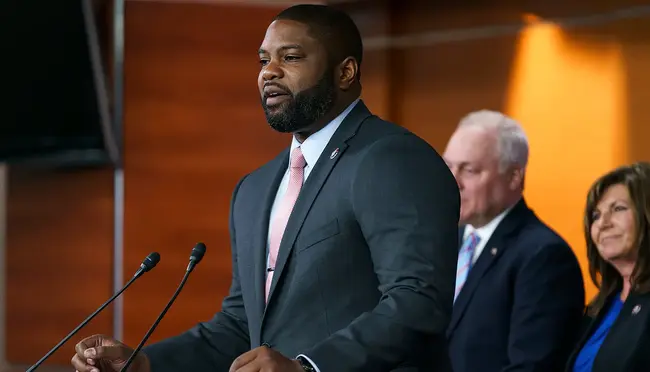Highlights:
- A U.S. representative is planning to introduce a bill that is set to make the strategic Bitcoin reserve permanent.
- The bill will need a majority support in the Senate and House to become law if introduced.
- The bill follows other bills that are already in debate in both houses.
U.S. Representative Byron Donalds plans to introduce a bill to ensure that President Donald Trump’s executive order on a strategic Bitcoin reserve remains in place. The signed executive order creates a national Bitcoin reserve using property confiscated during government investigations of criminal cases.
The proposed legislation by Byron Donalds would establish the Bitcoin reserve as a permanent part of U.S. financial policy. In particular, this move would prevent future administrations from reversing it through executive action.
US Rep. Byron Donalds to introduce bill codifying Trump’s Bitcoin reserve
A new bill set to be introduced in Congress aims to formalize President Donald Trump’s executive order establishing a US Strategic Bitcoin Reserve, a move that could further integrate Bitcoin into the …
— NORQUE-NOQ (@NorqueNoq) March 14, 2025
According to the Republican, the bill serves to put an end to the remaining opposition against digital assets. He argues that formally making Bitcoin a reserve would create stability by minimizing any rapid policy modifications. The proposed legislation will protect the U.S. Digital Asset Stockpile from being eliminated by future presidential decisions.
The executive order grants the Treasury and Commerce Departments the authority to develop strategies to acquire Bitcoin without burdening the taxpayer. The bill does not stipulate that they must make new purchases, but it allows them to develop budget-neutral approaches to expand the reserve. While the current policy does not require the agencies to buy Bitcoin, it leaves room for future consideration.
Congressional Approval and Challenges Ahead
The bill needs a minimum of 60 votes from senators and a majority approval in the House to become law. The bill has a chance to pass because Republicans control the Senate and most support virtual assets. Securing bipartisan support is a big hurdle because some legislators are reserved about the long-term success of digital assets.
At least 23 states across the country have introduced Bitcoin reserve bills, which are at different stages of legislation. The current trend shows that some lawmakers are changing their stance on digital assets.
The support for Bitcoin continues to grow, yet funding models and secure custody options continue to represent key challenges. In addition, the government needs to develop reliable Bitcoin storage methods that meet current financial regulations. The bill has the potential to spark additional conversations about digital assets and their role in national economic strategies.
Other Crypto Regulations and Future Policies Related to Strategic Bitcoin Reserve
The bill supports ongoing digital asset legislative initiatives, which include FIT21 and the GENIUS Act. The House has successfully passed FIT21, which establishes agency oversight roles in digital asset markets. Meanwhile, the GENIUS Act seeks to establish a framework for stablecoins as a recognized payment method.
Donald’s proposal comes shortly after leading figures in the digital asset industry met with Trump during the White House summit. The event shows rising interaction among regulators and members of the industry.
The passed bill focuses on the protection of Bitcoin reserves but could influence future policies for digital asset management. The adoption of an official government strategy regarding the strategic Bitcoin reserve will outline specific guidelines for managing digital state assets. Once approved, the proposed legislation by Byron Donalds will determine how the government interacts with digital assets in the future.
Best Crypto Exchange
- Over 90 top cryptos to trade
- Regulated by top-tier entities
- User-friendly trading app
- 30+ million users
eToro is a multi-asset investment platform. The value of your investments may go up or down. Your capital is at risk. Don’t invest unless you’re prepared to lose all the money you invest. This is a high-risk investment, and you should not expect to be protected if something goes wrong.






